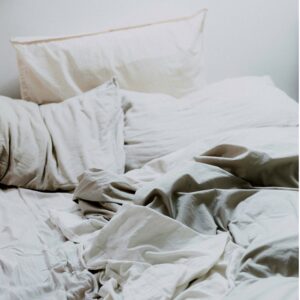
WHAT ARE THE PROBLEMS WITH SLEEP?
A WebMD survey found that people have trouble getting to sleep as well as staying asleep, spending 7.61 hours in bed and nearly 2 hours awake after bedtime.
The problems are: 1) taking more than 20 minutes to fall asleep, and 2) waking up at night.
The culprits are:
- Sleep disorders such as insomnia, obstructive sleep apnea, restless leg syndrome, and narcolepsy. (I’m going to get on my soapbox here. I have sleep apnea and the best thing I ever did for myself is get a CPAP machine. If you snore, get yourself evaluated!)
- Obesity and other health conditions such as anxiety, depression, GERD, etc.
- Getting up to pee.
- Other sleep disturbances include emotional or mental distress, physical pain, being too hot, frightening or intense dreams, and being disturbed by others.
These disorders are equal opportunity and affect members of every race/ethnicity, socioeconomic class, age, and sex.
IS NOT GETTING ENOUGH SLEEP ALSO A PROBLEM?
Amazingly, one in three adults do not get the recommended amount of uninterrupted sleep (seven to eight hours a night) they need to stay healthy. Sleep deprivation can lead to chronic health problems as well as affect how you think, react, work, learn, and get along with others. Not to mention things like car crashes. Furthermore, since the pandemic, a study published in the Journal of Clinical Sleep Medicine reports that 40 percent of 2,500 adult participants reported a reduction in sleep quality.
Of course, we all have reasons—some good some not. Working long hours or several jobs, working shifts, traveling for work, or not leaving enough time to sleep are culprits. Then too, taking meds to stay awake or misusing alcohol or drugs can interfere with healthy sleep.
WHAT CAN WE DO ON OUR OWN TO GET A BETTER NIGHT’S SLEEP?
Jolene Hart, a Philadelphia-based certified health coach and author of the new book, Well-Rested Every Day states: “Our nervous systems have been hijacked by constant overstimulation–text alerts, email pings, video popups–and by the end of the day it is so hard to flick off the switch.”
She suggests an evening routine that includes dimming the lights and skipping screens as well as scary or suspenseful books and movies. Keeping stress levels low at night is crucial. Taking a warm bath, shower, or sauna can be a natural relaxation trigger.
PRIVATE ENTERPRISE TO THE RESCUE OF THE SLEEP DEPRIVED
Never fear, Americans. Our industrious private sector has come to the rescue. If you are exhausted you can take a sleep vacation! OK, frankly this sounds counterintuitive to me to spend boatloads of money to do something I can do at home for free. But apparently, the public is buying in. The sleep industry is expected to increase by $409 billion by 2028.
The Hotel Figueroa in Los Angeles, for instance, has a special suite that features light therapy, Molekule air purifiers, and customized Pluto Pillows to help you catch some zees. Or you might try the sleep package at Springs Resort in Pagosa Springs, Colorado.
FINAL THOUGHTS ON SLEEP DEPRIVATION
I live out in the middle of nowhere. Hmmm. I wonder if I can turn my office into a sleep B&B? My five hundred square feet, complete with bathroom and kitchen area, is downright cozy. Furthermore, deprivation of the senses is a snap. Blackout curtains, the humming of the air conditioner, and no road traffic should keep even the sensitive sleeper out like a light. I’ll even throw in a breakfast of fruit and kolaches. …Writing up a business plan as we speak!
Photo by Priscilla Du Preez 🇨🇦 on Unsplash
Sign up on www.mariewatts.com to receive future Stories About Life delivered to your email address or read more stories by clicking here.

Recent Comments